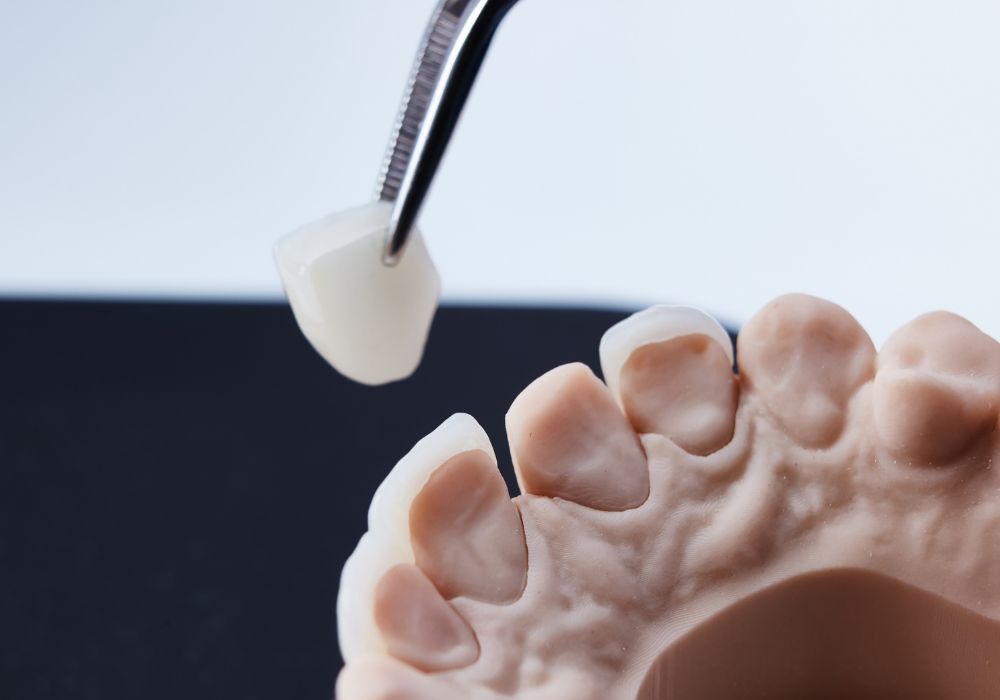If you’ve dealt with serious dental problems in your life, you may be considering dental veneers to finally have the smile of your dreams. Before you can bring this to reality, though, you need to understand how much it’s going to cost you.
The cost of dental veneers varies greatly depending on your situation and choices. Composite veneers are cheaper at about $250 to $1,500 per tooth, but they don’t last as long. Porcelain veneers cost more ($925 to $2,500 per tooth), but last twice as long.
Keep reading as we explain what leads to this cost, what your options are, and some more affordable alternatives.
What Affects the Cost of Dental Veneers
Just like everyone’s dental situation is different, no two veneers are the same. The cost of your veneers specific set depends on:
- The prep work you need to do
- The type of veneer (material) you want
- The number of teeth you’re covering
The location of your dentist office also influences what they need to charge for the procedures. All of these factors contribute to the price tag, although some dental insurance plans or payment plans may cover a portion of these costs.
Prep Work Needed
You may need to take care of a few issues before you can move forward with your veneers. This includes addressing problems like gum disease, cavities, and tooth decay. If you haven’t taken proper care of your teeth up to this point, this may add on to the costs consideration even before you get into the veneer process.
The type of veneer you choose also affects the amount of prep work you need. A diagnostic exam to assess your teeth and choose your veneer shade is normal. You may also need to make an impression of your teeth to send off to an external lab.
Type of Veneer

There are four types of veneers to consider:
- Temporary veneers
- Porcelain veneers
- Composite veneers
- No-prep veneers
The difference lies mostly in the material you choose and the amount of work needed for the procedure, but they all accomplish the same end goal.
Temporary veneers are the cheapest option, and they’re not intended to be a long-term solution. Porcelain veneers are the most expensive, but they also have the most preferred appearance and durability.
We’ll explore them in more depth in the next section so you can see why each variety exists.
Number of Teeth Covered
Dental veneers can be used to cover a single tooth as well as your full row of front teeth. As you would expect, the cost for a single tooth veneer will be much less than the full row.
If the majority of your natural teeth are fine and you only have one problem spot, you can save money with a single tooth veneer. You’ll go through a similar process, but there’s less work and material involved to drive up the cost.
Dentist Location
All dental procedures are influenced by the local economy. If you live in an area with a higher cost of living, expect your dental cost to be on the higher end of any estimates.
While dentists follow the same procedures and may have similar costs for material or outsourcing, what they charge must be enough to cover overhead costs like:
- Payroll
- Rent
- Utilities
Because of this, dentists in rural areas can usually charge less than those in urban areas. Consider this if you’re looking to lower your dental care costs.
Types of Veneers
There are four types of veneers to consider, each carrying their own advantages, disadvantages, and price ranges.
| Type of Veneer | Expected Price Range |
| Temporary | $20 to $1,000 (depending on size and sourcing) |
| Porcelain | $600 to $2,500 per tooth; $5,000 to $20,000 for full set |
| Composite (Resin-Bonded) | $250 to $1,500 per tooth; $2,000 to $10,000 for full set |
| No-Prep | $800 to $2,000 per tooth; |
While appearance and affordability are important, you should also consider longevity and durability.
Temporary Veneers
Temporary veneers are a simple clip on option. You can find fake temporary veneers online for a miniscule price, but these are usually poorly made, uncomfortable, and unattractive.
Dentists can make a set of temporary veneers that slide over your teeth, similar to a mouth guard. This is how they protect your teeth during the period in between prep work and application of permanent porcelain veneers.
Temporary veneers are less comfortable and have a bulkier, rougher appearance. They are not the ideal end-product for this cosmetic dentistry procedure. However, if you need temporary veneers as a transition, cosmetic dentists in London can provide you with a consultation.
Porcelain Veneers
Porcelain veneers are arguably the best looking options, but they’re also the most expensive. They have a nice, shiny milk-white appearance and look like the best version of human teeth.
Part of the cost for porcelain veneers is wrapped up in the more involved formation process. Unless your dentist uses CAD/CAM technology in house, they must grind down your natural tooth enamel, make an impression, and send this to another lab to mold the veneers.
You must also cover the cost of temporary veneers to protect your teeth until your final set comes in. This affects how much veneers cost as well as your comfort during this time.
Porcelain veneers last anywhere from 10 to 20 years.
Composite Veneers
Composite resin veneers are less expensive and can usually be applied in the same session, but they only last about half as long as porcelain (5 to 10 years).
While your consultation, exam, and x-rays are done in a different appointment, composite veneers are usually formed in one sitting. Your dentist will apply an etching agent to your tooth surface followed by a thin layer of the composite material.
It still takes a while to shape the teeth while applying each layer, but you should walk away with your teeth that same day. This means you aren’t paying for additional processes like imaging or molding the full set of veneers.
No-Prep Veneers
No-prep veneers are relatively new technology limited to specific brands like dental Lumineers London or Vivaneers. They require practically no work on your natural teeth, and instead create thick porcelain shells that snap right on.
Ultimately, this is the least invasive way to improve the appearance of your teeth. It takes far less time than other methods and doesn’t damage your existing teeth.
Unfortunately, these veneers are only known to last about 5 to 7 years before issues arise.
Covering the Cost of Dental Veneers

The first thing to consider when paying for dental veneers is what your insurance may cover. Most consider this a cosmetic dental procedure, and they’re reluctant to cover any portion of the costs for permanent veneers.
Your insurance coverage may allow for payment of some (if not all) of your diagnostic and exam fees, and that’s nothing to skim over.
Your dental office may offer in-house financing through a monthly payment plan, or they can direct you to a lender that specializes in dental or medical financing. Financing options like those offered through CareCredit require credit approval, but they waive interest fees if you pay the bill in a certain amount of time.
If money is a concern, consider choosing a lower cost option. We recommend choosing the more durable option if you can afford it, but there’s nothing wrong with choosing composite instead of resin and keeping yourself from financial distress.
Even temporary veneers can do wonders for improving your confidence. Consider covering a single tooth if that’s all you can afford.
Alternatives to Dental Veneers
Veneers are not your only option to improve the appearance of your teeth, and they may not be best for your situation.
Alternative include:
- Teeth whitening: if discoloration is your main concern; cheaper and less invasive than veneers
- Dental bonding: if you have minor chips or cracks; cheaper and less invasive than veneers
- Orthodontic treatment: for multiple crooked or misaligned teeth; cost varies spending on the type of treatment, but allows you to preserve natural teeth and potentially resolve other issues
- Crowns or implants: for severely decayed or compromised teeth; allows you to target the structure of a single tooth
- Dentures: if you have whole-mouth issues; cost and care varies; strays further from natural mouth, but may be the best solution for larger issues
Your ultimate decision should stem from what is best for your oral health and what you can afford.
Conclusion
The cost of dental veneers ranges anywhere from $250 (for a single composite tooth) to $20,000 (for a full porcelain set), and it’s difficult to pin down an exact figure until you actually go in for a consultation. If you’re interested in dental veneers, we recommend bringing it up with your dentist for a more personalized cost-estimate.
If you’re considering dental veneers, remember that you can control cost by:
- Staying on top of your underlying dental health
- Choosing the material that works best for your situation
- Opting for a single tooth or full arch veneer
There’s plenty to consider before you follow through with your decision, and we encourage you to ask as many questions as you need to make the right choices. Drop a comment below if there’s anything else you want to know about dental veneers or their costs.






